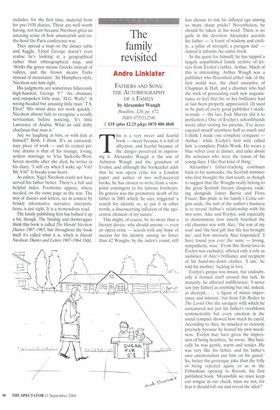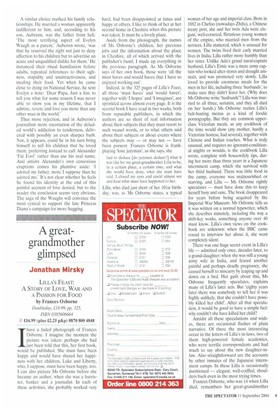The family revisited
Andra Linklater
FATHERS AND SONS: THE AUTOBIOGRAPHY OF A FAMILY by Alexander Waugh Headline, £20, pp. 472, ISBN 0755312546 f18 (plus 12.25 p&p) 0870 800 4848 This is a very sweet and fearful book — sweet because it is full of affection, and fearful because of the danger perceived in expressing it. Alexander Waugh is the son of Auberon Waugh and the grandson of Evelyn, and although the bookjacket adds that he was opera critic for a London paper and author of two well-received books, he has chosen to write from a viewpoint contingent to his famous forebears. Its genesis was the premature death of his father in 2001 which, he says, triggered 'a search for identity or, to put it in other words, a disconcerting inflation of the egocentric element of my nature'.
This might, of course, be no more than a literary device: why should anyone — even an opera critic — search with any hope of success for his identity among no fewer than 42 Waughs, by the index's count, still less choose to risk his inflated ego among so many sharp pricks? Nevertheless, he should be taken at his word. There is no guile in the devotion Alexander accords his father — 'a fount of wisdom and civility, a pillar of strength, a paragon dad' — indeed it informs the entire book.
In the quest for himself, he has tapped a largely unpublished family archive of letters from Evelyn's father, Arthur. Much of this is interesting. Arthur Waugh was a publisher who flourished either side of the first world war, the chief executive of Chapman & Hall, and a charmer who had the trick of persuading each new acquaintance to feel that his or her brilliance had at last been properly appreciated. (It used to be part of every good publisher's stockin-trade — the late Jock Murray did it to perfection.) One of Evelyn's schoolfriends wrote after visiting his parents, 'I've never enjoyed myself anywhere half so much and I think I made one complete conquest — Arthur,' while Evelyn's first wife called him 'a complete Pinkle-Wonk. He wears a blue velvet coat at dinner, and talks about the actresses who were the toasts of his young days. I like that kind of thing.'
Alexander's father-tracking continues back to his namesake, the Scottish minister who first brought the clan south, as though to suggest that the Waughs really belong to the great Scottish literary diaspora, ranking alongside James Barrie and Flora Fraser. But pride in his family's Celtic origins aside, the nub of the author's business is to reveal Arthur's relationship with his two sons. Alec and Evelyn, and especially to demonstrate how utterly besotted the old charmer was with Alec, 'the son of my soul' and 'the best gift that life has brought me', and how intensely Alec responded: 'I have found you ever the same — loving, sympathetic, wise.' From this florid love-in Evelyn was excluded, offered only a role as audience of Alec's brilliance and recipient of his hand-me-down clothes. 'I am,' he told his mother, 'lacking in love,'
Evelyn's genius was innate, but undoubtedly it formed itself around this lack. In maturity, he affected indifference: 'I never saw f my father] as anything but old, indeed, as decrepit. . .. a figure of minor importance and interest,' but from Vile Bodies to The Loved One the savagery with which he caricatured not just his father's overblown sentimentality but every emotion in the social compact showed how much he cared, According to Alec, he attacked so viciously precisely because he feared his own neediness. 'Evelyn may have given the impression of being heartless,' he wrote. 'But basically he was gentle, warm and tender. He was very like his father, and his father's own emotionalism put him on his guard.' So, better the grotesque joke than the folly of being rejected again, or as in the Firbankian opening to Rossetti, his first published book, 'Meanwhile we must keep our tongue in our cheek, must we not, for fear it should loll out and reveal the idiot?' A similar choice marked his family relationships. He married a woman apparently indifferent to him, and, according to his son, Auberon, was the father from hell. 'The most terrifying aspect of Evelyn Waugh as a parent,' Auberon wrote, 'was that he reserved the right not just to deny affection to his children but to advertise an acute and unqualified dislike for them.' He instanced their ritual humiliation before adults, repeated references to their ugliness, stupidity and unattractiveness, and stealing their food. Yet when he came close to dying on National Service, he sent Evelyn a note: 'Dear Papa, Just a line to tell you what for some reason I was never able to show you in my lifetime, that I admire, revere and love you more than any other man in the world.'
Thus more rejection, and in Auberon's journalism more excoriation of the deluded world's addiction to tenderness, delivered with possibly an even sharper barb. Nor, it appears, could he in his turn bring himself to tell his children that he loved them, preferring instead to call Alexander 'Fat Fool' rather than use his real name. And amidst Alexander's own censorious eruptions comes his plaintive aside; 'I adored my father, more I suppose than he adored me.' It's not clear whether he feels he found his identity at the end of this painful account of love denied, but to the reader the conclusion seems very obvious. The saga of the Waughs will convince the most cynical to support the late Princess Diana's campaign for more hugging.











































































 Previous page
Previous page